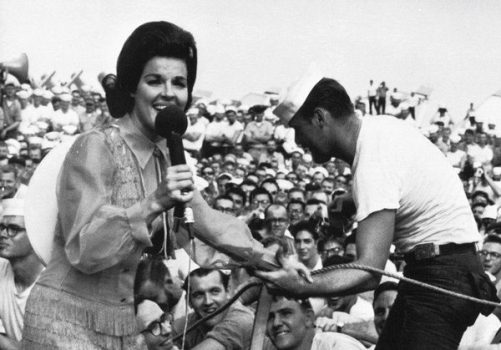
Singer Anita Bryant died Dec. 16, though her death wasn’t widely reported until Jan. 10. The headlines announcing her death were very similar to this one run by the Associated Press: “Anita Bryant, a popular singer who became known for opposition to gay rights, dead at age 84.”
Bryant launched one of the nation’s first anti-LGBTQ+ crusades in Dade County, Fla., which in 1977 passed an ordinance that barred discrimination in employment, housing and public services on the basis of sexual orientation.
A former beauty queen, Bryant was an Oklahoma native who had relocated to Florida with her husband (whom she later divorced). A fundamentalist Christian, she was appalled by the new law and began insisting, against all available evidence, that it would force Christian schools to hire gay men and women as teachers. (In fact, the law didn’t apply to private schools.)
Bryant started a campaign, dubbed “Save Our Children,” to overturn the law. The emphasis on children was intentional: LGBTQ+ people were tarred as a threat to children, a threat to families, a threat to America.
If these tactics sound familiar, there’s good reason for that: Christian Nationalists still use them today. In fact, much of the hate and extreme rhetoric we hear from Christian Nationalists today about LGBTQ+ rights comes from a playbook penned by Bryant.
As I noted in a Church & State article last year, “During the campaign, Bryant employed rhetoric and tactics that Christian Nationalists still use nearly 50 years later. She demonized LGBTQ+ people, asserting that they seek to recruit children, and she mobilized crowds in fundamentalist churches.
“Homosexuals cannot reproduce, so they must recruit,” Save Our Children argued. “And to freshen their ranks, they must recruit the youth of America.”
Bryant went so far as to compare LGBTQ+ rights to “murderer rights.”
Sadly, Bryant’s hateful crusade was initially successful, and voters overturned the Dade County ordinance. Flush with that victory, she went on to successfully challenge gay-rights ordinances in St. Paul, Minn.; Eugene, Ore.; and Wichita, Kan.
But eventually, Bryant and her supporters overreached. One of them, John Briggs, a California state senator, proposed Prop. 6, which would have barred gay men and women from teaching in the state’s public schools as well as banned “public homosexual conduct.” Critics said that provision was so broadly worded it could have made it illegal for state employees to express support for LGBTQ+ rights. Many conservatives opposed Prop. 6, which was defeated in 1978 with more than 58% voting no.
Bryant’s activism also put LGBTQ+ Americans on notice: They were under assault. In response, they increased their mobilization, and gay-rights activism became more high profile. Slowly, the tide began turning in America. Polls now show solid support for LGBTQ+ rights, but these rights are bound to come under sustained assault when Donald Trump assumes the presidency next week.
As for Bryant, she never wavered in her opposition to LGBTQ+ rights. Her views were so extreme, she became toxic. Companies that had used her as a spokeswoman dropped her, and Bryant’s attempts to reignite her singing career failed. As the time of her death, she was running a ministry in Oklahoma.
Anita Bryant, despite whatever else she may have accomplished, will forever be linked to religious extremism and hateful homophobia. It did not have to be that way, but it’s the legacy she chose. It’s an unfortunate one indeed.
Photo: Anita Bryant at a concert in 1965. Public domain photo.